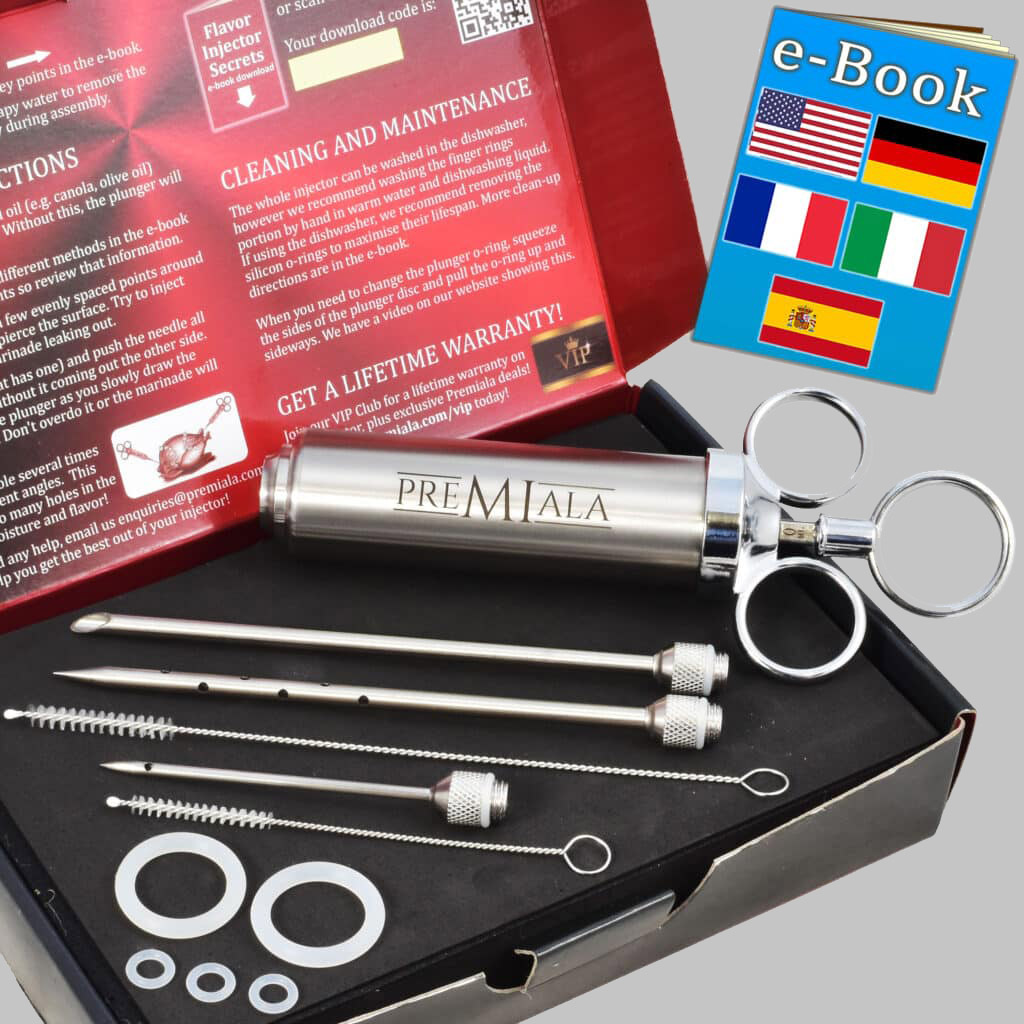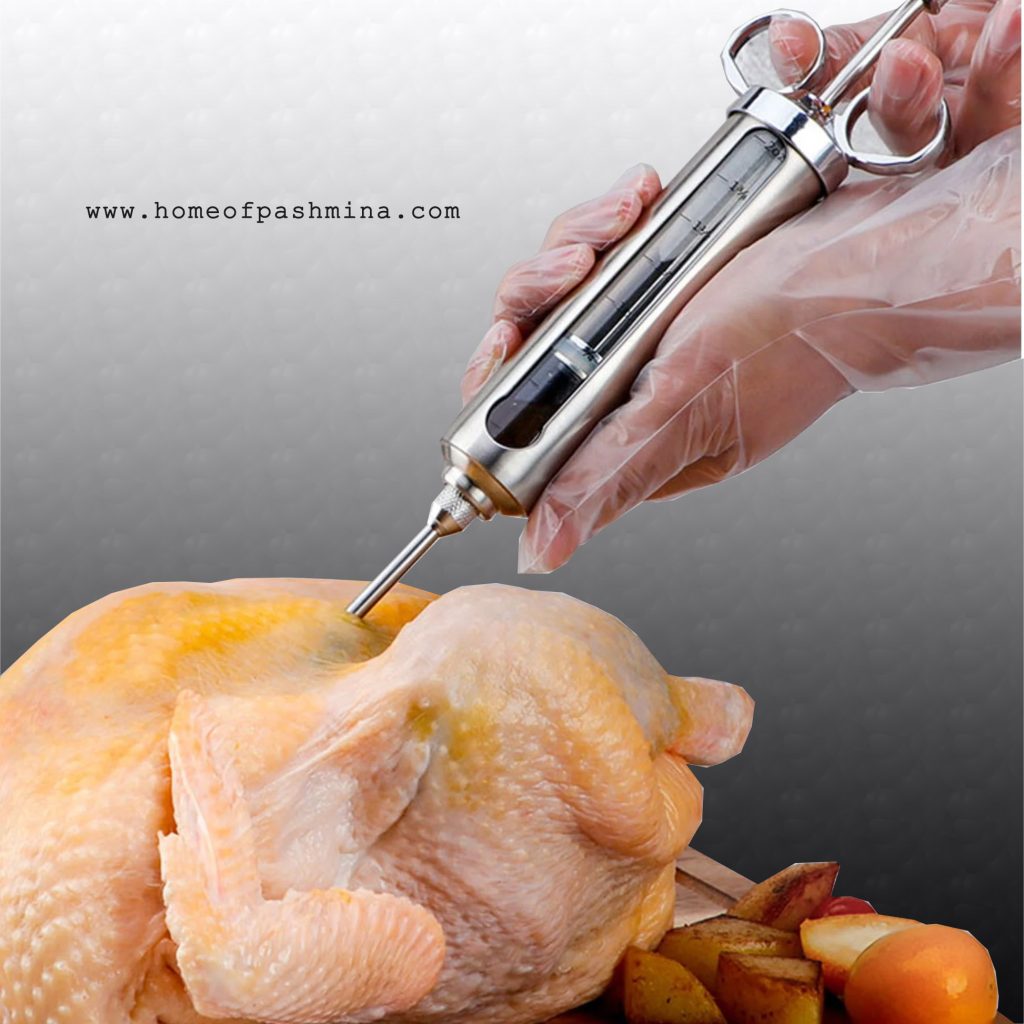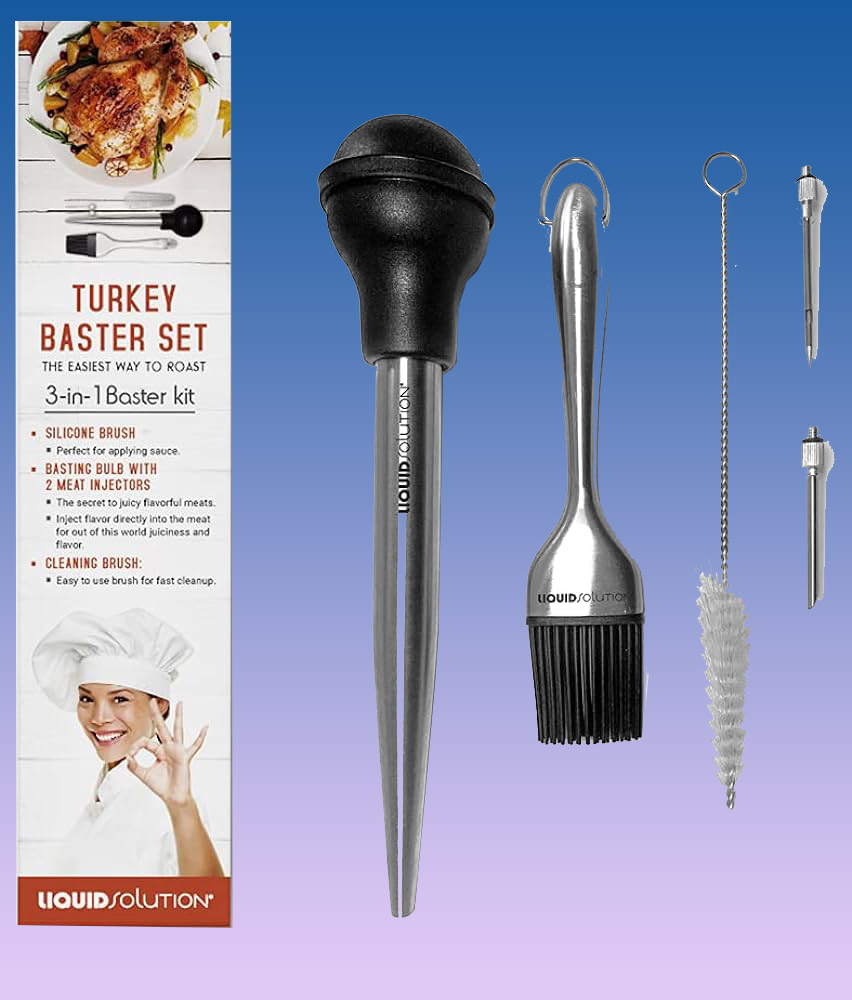Injecting meat with an injector involves filling the syringe with your flavoring solution and piercing the meat at regular intervals, gently squeezing the marinade into its core. Mastering the use of a meat injector can dramatically elevate the flavor and juiciness of your meals, directly infusing seasonings deep within the meat’s fibers.
This simple yet powerful technique ensures that every bite is packed with taste, bypassing the often slow and superficial process of marinating. Whether you’re preparing a succulent roast or grilling a delectable steak, an injector allows for precise flavor enhancement, turning ordinary recipes into gourmet creations.
With an injector, your meats not only absorb more of your favorite marinades and brines but also retain optimal moisture throughout the cooking process, making dry or under-seasoned dishes a thing of the past. For chefs and home cooks alike, this tool is an indispensable asset to unlock profound layers of taste in even the thickest cuts. How to Inject Meat With an Injector: 5 Flavor Boost Secrets.
The Art Of Injection
Injecting meat is like giving flavors wings to fly deep inside your cuts of meat.
This method brings out juiciness and taste that mere surface seasoning can’t match.
Discover the technique that transforms ordinary meats into mouthwatering feasts with every bite.
Why Use An Injector?
Flavor to the core: An injector pushes marinades beyond the surface.
Enjoy enhanced taste and spices from inside out.
- Moisture magic: Dry meat no more. Injecting ensures every slice is juicy.
- Even marinating: No uneven pockets of flavor. Get a consistent taste throughout.
Selecting The Right Injector
Injector choice makes a huge difference. Here’s how to pick the best one:
| Size | Type | Material |
|---|---|---|
| Large volume | Needle with multiple holes | Stainless steel |
| Small to medium | Single-hole needle | Plastic or metal |
Note: A metal injector with a long needle suits thick marinades and large meats.

Preparing Your Meat
Preparing your meat for injection is a crucial step in the marinating process. It ensures the flavors deeply penetrate the meat. Proper preparation can make a world of difference to the final dish. Let’s walk through how to select the best cuts and prepare them correctly before using a meat injector.
Choosing The Best Cuts
The quality of your meat matters. Look for cuts that benefit from added juiciness and flavor.
- Beef: Brisket and chuck roasts are ideal for injecting.
- Pork: Pork shoulders and loins soak up flavors well.
- Poultry: Chicken breasts and turkey are perfect canvases.
Cleaning And Trimming Tips
Before injecting, proper cleaning and trimming are essential.
- Wash the surface under cold water and pat dry with paper towels.
- Trim excess fat and silver skin for even cooking.
- Cut away any unwanted parts or tendons.
- Keep the cut uniform in thickness for consistent flavor infusion.
Crafting The Perfect Marinade
A perfect marinade transforms ordinary meat into a flavor-packed feast.
It’s essential for juicy, tender results. Today, let’s learn how to blend the best brew for your next barbeque.
Ingredients That Make Flavors Pop
Your marinade’s base sets the stage for deliciousness. Consider these must-haves:
- Acid – like vinegar or citrus juice, tenderizes the meat
- Salt – helps flavors penetrate deeper
- Sugar – for a touch of sweetness and caramelization
- Soy sauce – injects umami and complexity
- Fresh herbs – add brightness and aroma
- Garlic – infuses a classic, pungent kick
- Mustard – offers tang and binds other elements
Balancing Spices And Liquids
Striking the right balance is vital for texture and taste.
| Spices | Liquids | Ratio |
|---|---|---|
| Cayenne pepper, paprika, black pepper | Broth, wine, beer | 1 part spice to 3 parts liquid |
| Curry, turmeric, cumin | Yogurt, coconut milk | 1 part spice to 4 parts liquid |
Remember to whisk spices into liquids until fully dissolved.
This makes sure flavors spread evenly once injected.
Injection Techniques
To take your home-cooked meats to a new level of deliciousness, mastering the art of injection is key.
Injected marinades ensure that every bite is flavorful and juicy.
Here are essential techniques to inject meats like a pro!
Finding Injection Points
Finding Injection Points
Identifying the perfect spots to inject marinades is the first step to flavor-packed meat.
Opt for deep, evenly spaced points in the meat.
- Avoid the outer edges as they may cause leakage.
- Target the center of thick cuts to reach the core.
- Use the gaps between muscles as natural channels for distribution.
Ensuring Even Distribution
Ensuring Even Distribution
Even distribution is crucial for consistent taste and texture.
Follow these steps for the best results:
- Map out your injection sites before you start.
- Space injections about an inch apart.
- Inject slowly to allow the marinade to settle.
- Monitor marinade levels and adjust injections accordingly.
Marinade Injection Patterns
Unlock the secret to juicy, flavorful meat! Marinade injection lets flavors sink deep.
Two popular methods exist. Each has its unique perks. Master these to become a backyard BBQ hero!
Crosshatch Method
Neat, even flavor is the Crosshatch goal. Imagine a checkerboard across your meat. That’s your pattern guide.
Here’s how:
- Insert the injector at a 45-degree angle.
- Pull out slightly, change direction, insert again.
- Repeat this step to create a series of X’s or diamonds.
- Ensure spacing between 1 to 2 inches apart for consistency.
The Crosshatch ensures even distribution. Your meat soaks up flavor in every bite!
Spot Injecting Strategy
Spot injecting targets specific meat areas.
- Pick your spots – thicker sections usually need more.
- Plunge the injector straight down into these areas.
- Depress the plunger slowly to fill the meat.
This method is great for larger cuts where flavors must reach deep.
With both Crosshatch and Spot Injecting, expect mouthwatering results every time!
Controlling The Flow
Mastering the art of injecting meat requires precision. An even flow ensures deep flavors throughout. Let’s explore how to maintain control during injection.
Avoiding Leaks And Spills
To prevent leaks and spills, start by checking the injector. Make sure all parts fit tightly. Use a tray to catch any drips. Always insert the needle smoothly to avoid puncture mishaps. Aim for the center of thick cuts. Surrounding thinner areas are more prone to leaks. Practice makes perfect.
Pressure And Pace Adjustments
Correct pressure and pace are crucial. Begin with a gentle push on the plunger. Gradually increase pressure if needed. Maintain a slow, steady pace for even distribution. Observe the meat’s response. If it swells quickly, ease off to avoid back-flow. Consistency is key to flavor infusion.
- Start slow: Learn the injector’s resistance.
- Feel the meat: Adjust based on density and texture.
- Steady hand: Ensure a continuous, smooth injection.
Post-injection Tips
Once you’ve masterfully filled your favorite cuts of meat with delicious marinades using a meat injector, follow these essential post-injection tips to ensure that the juices are perfectly absorbed, and the flavors meld for an exquisite taste experience.
Resting Time For Maximum Absorption
Resting the meat after injection is a critical step. It allows the injected liquid to distribute evenly throughout the tissue. Consider a resting period of at least 30 minutes for small cuts and up to a few hours for larger roasts. This patience rewards you with an evenly flavored and juicy result.
- Small cuts: Rest for 30 minutes
- Large cuts: Rest for 1-2 hours
Handling Surface Spills
Surface spills are common after injecting meat. Avoid wiping these flavorful juices away. Instead, gently pat the surface of the meat to assist in the absorption of the excess marinade. This step ensures that every bit of flavor contributes to the final taste of your dish.
| Action | Benefit |
|---|---|
| Gently patting | Enhances flavor absorption into the meat |

Cooking Considerations
Mastering the art of meat injection is just one step towards succulent, flavorful dishes. To bring your culinary creation to perfection, it’s critical to consider cooking techniques. Correct temperature, timing, and flare-up management ensure your meat cooks evenly, retaining all that juicy goodness injected inside.
Temperature And Cooking Time
When injecting meat, inside flavors mingle with natural juices. Even heating is crucial. Use a meat thermometer to check internal temperatures. Here’s a quick guide:
- Beef: Cook to 145°F for medium rare, 160°F for medium.
- Poultry: Reach a safe 165°F throughout.
- Pork: Aim for 145°F with a 3-minute rest.
Listen closely to the sizzle. Are edges cooking faster? It may be time to lower heat or adjust the placement on the grill. Equal exposure on all sides ensures thorough cooking.
Dealing With Flare-ups
Injected meat carries extra oils and fats, potentially causing flare-ups. Be vigilant! Quick, smart moves can save the day. A three-step plan works wonders:
- Zone your grill. Establish areas for direct and indirect heat. Ready to shift meat away at the first sign of a flare-up.
- Lid control. Covering the grill cuts oxygen, snuffing out flames. Use the lid strategically.
- Water spray bottle. A fine mist can tame a flame without dousing your meat’s flavor.
Patience pays off. Allow meat to rest after cooking. It reabsorbs juices, enriching every bite with injected flavors.
Advanced Flavor Enhancements
Meat lovers rejoice! Taking your favorite cuts to new heights is now easier with an injector. This tool adds depth and complexity to meats. Master the art of infused flavors.
Layering Flavors
Delight in each bite with a burst of taste. Layering flavors creates a symphony on your palate. Begin with a base, like a simple brine of salt and sugar. Add herbs and spices that complement your meat’s natural flavors.
Follow this guide:
- Choose a Base: Saline solution or broth.
- Add Aromatics: Garlic, onions, or herbs enhance the profile.
- Finish with a Twist: Liquids like juice or wine add a surprise element.
Experimenting With Injection Mixes
The real magic unfolds when you experiment. Discover unique combinations by mixing different liquids and flavors. Consider the meat’s texture and doneness. This knowledge helps find the perfect match.
Create these standout mixtures:
| Meat Type | Injection Mix | Purpose |
|---|---|---|
| Beef | Beef stock, Worcestershire sauce | Enhances beefy taste |
| Pork | Apple juice, maple syrup | Adds sweetness |
| Chicken | Butter, thyme infusion | Promotes juiciness |
Ready to explore? Use the injector to introduce these mixes into the meat. Spread them evenly. The goal is to make every bite exciting. Enjoy the transformation in your home-cooked meats.
Cleanup And Maintenance
After infusing your meats with rich flavors using an injector, keeping this essential tool clean ensures its durability and readiness for your next culinary adventure.
Proper Injector Cleaning
To maintain your injector’s performance, a thorough clean is crucial.
Immediately after use, disassemble your injector piece by piece.
- Soak all parts in warm, soapy water.
- Use a brush to scrub inside the needle and barrel.
- Rinse under running water to remove all soap residues.
- Dry each component completely before reassembling.
Neglecting to clean properly can lead to clogs and flavor cross-contamination.
Storage For Longevity
Storing your injector correctly can extend its life significantly.
- Avoid dampness to prevent rusting.
- Keep all parts together in a clean, dry place.
- Use a case or box to protect from damage.
Your injector will be ready and reliable for your next tasty creation.
Common Pitfalls To Avoid
Injecting marinade into meats can elevate flavor and tenderness. But mistakes might ruin a good meal. Below, learn about common pitfalls and how to avoid them.
Over-injecting
More isn’t always better.
Injecting too much marinade can cause issues:
- Uneven flavor – Pockets of strong taste contrast with bland areas.
- Texture problems – Meat can become mushy.
- Leakage – Excess liquid exits during cooking.
To dodge over-injecting, follow these guidelines:
- Measure correctly – Use a specific amount per pound of meat.
- Space out injections – Distribute evenly across the meat.
- Inject slowly – Allow the marinade to settle within the tissues.
Choosing The Wrong Marinade Consistency
Selecting the right marinade texture is crucial.
Thick sauces clog the injector. Watery marinades lack flavor. Aim for a balance.
| Too Thick | Ideal Consistency | Too Thin |
|---|---|---|
| Doesn’t pass through needle | Smooth, no large pieces | Lacks substance |
| Can’t penetrate meat well | Easily injected, flavors penetrate | Doesn’t adhere to internal tissues |
Blend marinades to achieve the perfect consistency.
Straining helps – It removes solid bits that could block the needle.
Recipes For Success
Unlock the secrets of juicy, flavor-packed meat with our ‘Recipes for Success’. Injecting marinades directly into meats transforms every bite. It’s a game-changer for taste-seekers and home chefs alike. Below, discover recipes and ideas to captivate your taste buds and wow your dinner guests.
Crowd-pleasing Injected Recipes
Dive into recipes that make your meats unforgettable:
- Garlic-Herb Roast Chicken: Infuse your bird with a mix of garlic, thyme, and chicken broth.
- Sweet and Spicy Pork: Sweet apple juice and fiery hot sauce blend for a bold pork shoulder.
- Butter-Injected Steak: Elevate your steak with rich, melted butter and a touch of rosemary.
These recipes ensure every meal is a hit. Your guests will beg for your secrets!
Creativity In Your Marinade Mixes
Experiment with ingredients to craft custom marinades:
| Base Liquid | Bold Flavors | Aromatic Ingredients |
|---|---|---|
| Beef Stock | Worcestershire Sauce | Crushed Garlic |
| Pineapple Juice | Soy Sauce | Minced Ginger |
| Apple Cider Vinegar | Brown Sugar | Chopped Onions |
Mix and match to create unique flavors. Your meats will never be the same!

Frequently Asked Questions Of How To Inject Meat With An Injector
How Long Before Cooking Should You Inject Meat?
Inject meat 2 to 24 hours before cooking to ensure flavors permeate effectively. For best results, allow at least 1 hour for the injection to distribute flavors throughout the meat.
What Do They Inject Meat With?
Meat is often injected with solutions containing water, salt, and preservatives to enhance flavor and moisture. Some meats also receive injections of tenderizers or marinades to improve texture and taste.
How Much To Inject In Meat?
For injecting marinade into meat, use 1 to 2 ounces for every pound of meat to ensure optimal flavor and moisture.
How Do You Inject Meat Into Sauce?
To inject meat into sauce, use a marinade injector to draw the sauce and carefully release it into the meat at various points, ensuring even distribution of flavor.
Conclusion
Mastering the art of using a meat injector enriches your culinary skills and elevates your dishes. With practice, you’ll infuse flavors deep within your meats, ensuring each bite is bursting with taste. Remember, the key is to balance spices and liquids for the perfect marinade.
Happy cooking and savor the enhanced flavors!

I am a home Specialized writer and blogger based in the USA, Canada, Australia & UK. I have four years of experience in home and all types of Category. So I work on solving these issues and give various Resource on these issues.
